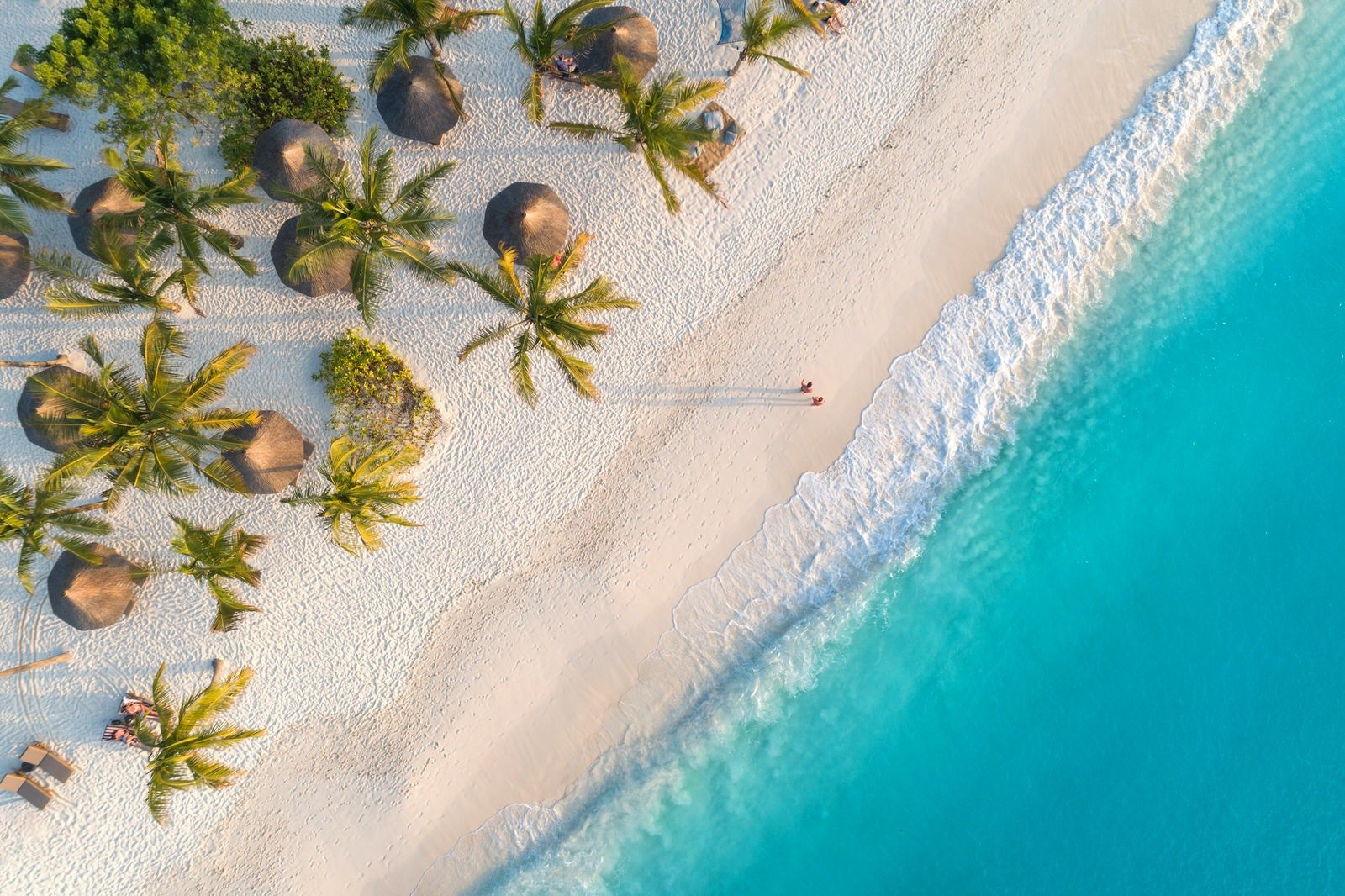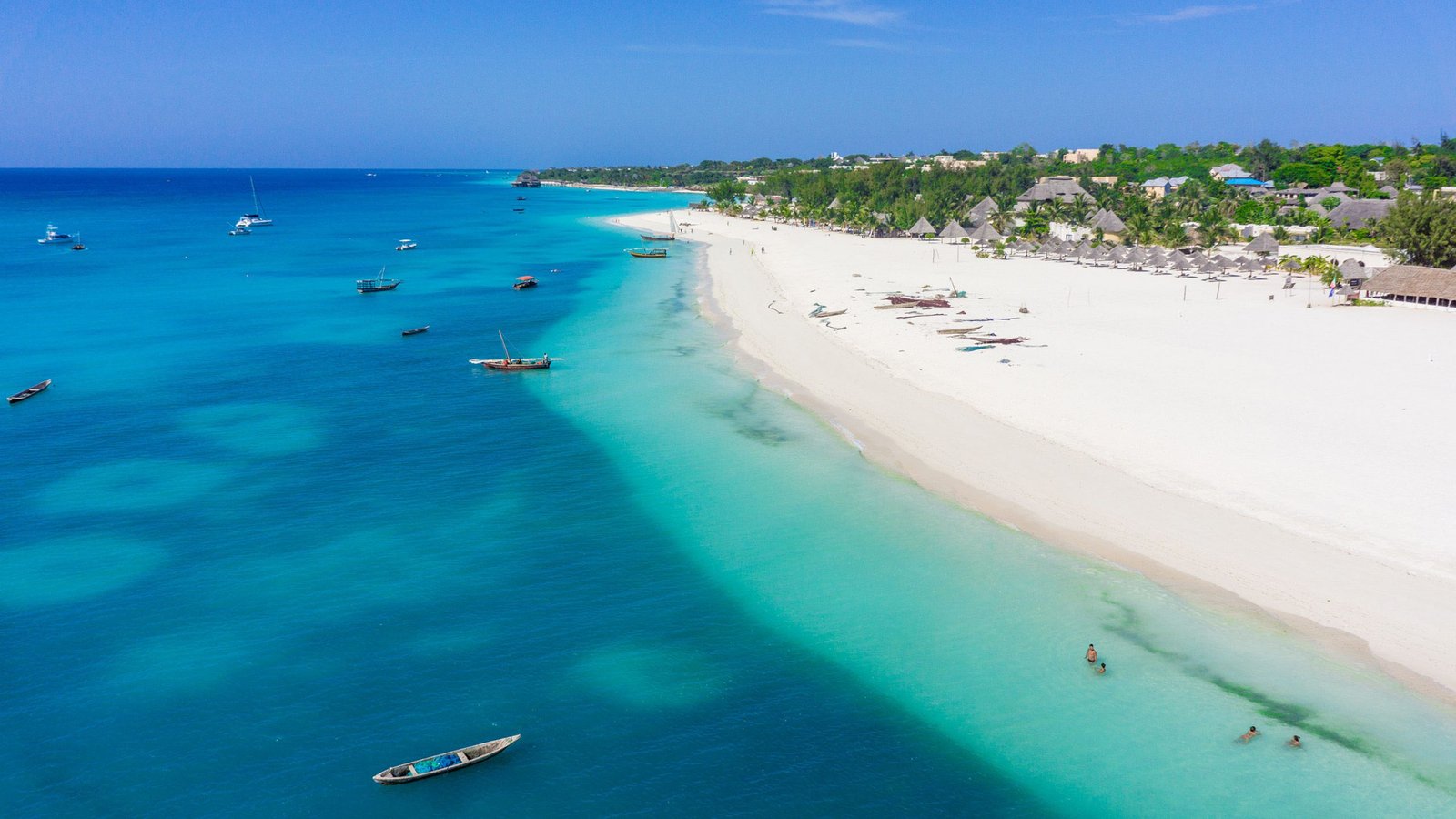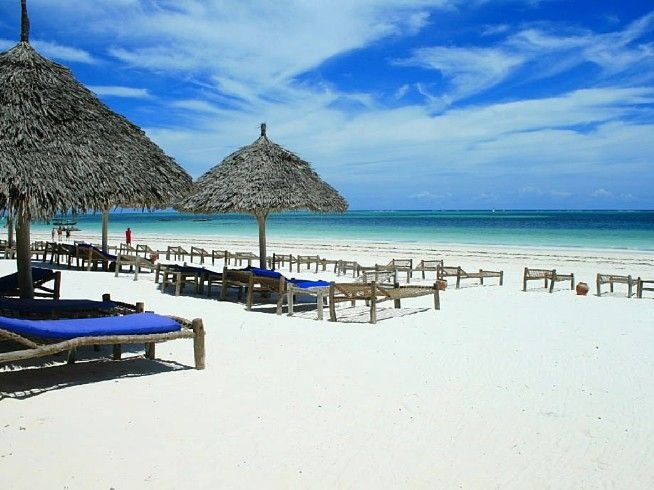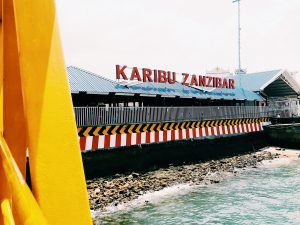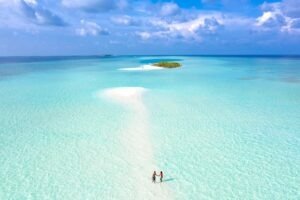
Vacation in Zanzibar
Vacation in Zanzibar, Known as the Spice Island, (Swahili Unguja), a beautiful island on Africa’s east coast is bursting with culture and history, seemingly at odds with its idyllic geography of white-sand beaches with palms swaying lazily in the sea breeze. Together this makes Zanzibar a fabulous place to explore as well as a dream to relax and unwind.

Zanzibar, also known as Magical Spice Island with stunning beaches, which forms part of the United Republic of Tanzania, which is located in East Africa is always unforgettable. In fact, Zanzibar is the name of a group of small islands and two large islands: Zanzibar and Pemba, located 35 km off the coast of Africa. We warmly invite you to explore this island and discover your ideal travel experience while on trip to Zanzibar and its beaches.

The island’s charm is marred by the virgin white beaches adorned with a blue-turquoise sea; In the white-washed crooked alleys of the Old City; In the night markets and the fresh food that was planted straight from the sea.
Zanzibar has a wide range of hotels. From magical and secluded suites on private beaches to family hotels with pool, private beaches and all the other treats you can only dream of.
Staying in Zanzibar is a unique and fascinating experience as a result of this combination of virginity and authenticity with advanced tourist services.
While on Vacation in Zanzibar, we can offer many options of doing short safari from Zanzibar to Tanzania mainland.
A vacation in Zanzibar is the perfect opportunity to escape the crowds and hustle and bustle of the city’s fast pace of life, catching peace as there is only on the African continent. Stroll barefoot on the beach and devote yourself to the good sun, snorkel in a beautiful riff or simply lay out a towel on the sand and enjoy the perfect peace. The depth of Zanzibar’s experience lies in the small details, the personal sewing, the secrets that those who know found a home in paradise.

The island and its beaches has been fascinating for travelers from around the world for centuries. They came here to trade ivory and spices, to buy slaves, and sometimes to conquer and settle down.
Today, tourists from around the world discover the virgin charm of the tropical island. International-class hotels allow the first-class tourist a treat and comfort, fine western cuisine, water sports clubs and fascinating rainforest tours, spice farms and more.
Zanzibar Beaches.
While on Vacation in Zanzibar, don’t miss to spend time on this amazing beaches;
Nungwi Beach.
This beach, in the northern point of Zanzibar, has a particularity: it’s barely the only coast on the island that is not affected by the tides. A beach for the swimmers, and for whom the sand is just the place where you can rest a few minutes before jumping again in the water.
It also has the most “party” ambience you’ll find in Zanzibar, so if night fun is what you seek, Nungwi is the beach you must visit during the daylight.
Nungwi beach is located on the west coast of Zanzibar.
The beach made the list in the top 25 beaches in the world in TripAdvisor’s travelers choice award.
Nungwi beach is always vibrant. The coast is blessed with coral reefs ideal for diving, snorkeling, and swimming. You may be lucky to spot dolphins, shark and green turtles at a certain time of the year. Nungwi beach has numerous resorts, bars, and restaurants with a variety of nightlife entertainment. You can also go for a sunset cruise on a traditional dhow sailing boat.
Because of its lively ambiance, Nungwi Beach may be a great destination for solo travelers as you’ll get to soak up the vibe of the island and even meet new people along the way.
Kendwa Beach.
Kendwa beach is one of the most popular beaches in Zanzibar. Located just a few miles before Nungwi village, the beach is slightly laid back compared to Nungwi beach. This top island beach does not have to deal with as much high and low tides, so the clear waters make it perfect for snorkeling, diving, and swimming without having to chase the ocean a mile away.
There are lots of fun activities to engage in like volleyball on the sandy beach, beach soccer, and so on.
Kendwa beach is also famous for its active nightlife and party atmosphere. The sunset accompanies loud beach parties. There are restaurants and bars dishing out mouth-watering cuisines and beverages. Aquatic creatures like the colorful starfish also take refuge on the beach just offshore.
Matemwe beach.
Matemwe beach can be found slightly to the east of Nungwi and Kendwa. As such, contrary to the more northern beaches, it can be tidal here.

Total calm. The whitest sands in Zanzibar. An incredible, photographic sunrise. And a coral reef protecting the whole beach that makes it perfect both for swimming and snorkeling. Are these features enough for you to fall in love with this beach? In Matemwe you will discover hundreds of different, colourful starfishes, and many other marine creatures. But watch out with sea urchins!
The area has been relatively untouched by tourism until recent years, and it can now get a bit busy. However, when the tide is in some beach lodges offer a pocket of Indian Ocean paradise for an unbelievable price.
Kiwengwa beach.
Kiwengwa is a great beach for families with kids. Across the beach, there are major hotel establishments with standard swimming pools and facilities.
There are also provisions for budget options – smaller lodges as well as Airbnb houses for rent. Swimming at Kiwengwa beach is not always possible, especially at low tide, so in some cases, it’s better to stick to the swimming pool facilities in your accommodation.
Pongwe beach.
Pongwe has one of the only east coast beaches which isn’t tidal as it sits neatly in a concave break in the coastline.
As such, if you like long beach walks, it is maybe not for you as you don’t get a sweeping beach picture, but it does give you a certain little slice of luxury in as much privacy as you can get on the island. If you don’t have a huge budget, then Pongwe is hands down the best place to stay in Zanzibar.
Paje beach.
The smooth white sand, the fine and clear waters, the shallows, and the winds that make Paje Beach a perfect place to practise Kite-Surfing.

Situated on the mid-east coast of the island, Paje and Dongwe’s beaches are long and sweeping giving that classic Indian Ocean feel, but again, it can be tidal. You get some super luxury and intimate options though, and as such, some of our absolute favourites are in this area for a very spoiling Indian Ocean paradise.
Jambiani beach.
Jiambani is a great place to visit for the best kite surfing on the island as there are consistently good winds.

This fantastic beach is really affected by the tides, so with low tide, you’ll have miles of sand to play and shallow waters to explore, and with a high tide, you can swim in the warmest waters on Earth.
Bars and restaurants surround the area, so you can spend the whole day in Jambiani enjoying the tides coming and going.
What to Eat while on Vacation in Zanzibar.

Chips mayai
Who knew a French fry omelette could taste so good? There’s nothing much to this comfort food dish, but it goes down a treat with condiments such as kachumbari (tomato and onion salad), chilli sauce, mayo and/or good old tomato sauce.

Mandazi
Mandazi, samosas and more.
These triangular ‘Swahili doughnuts’ are essentially deep-friend balls of dough, lightly sweetened and occasionally seasoned with a hint of cardamom. Yum.

Urojo soup
Also known as Zanzibar mix, this mash-up of a dish typically comprises a bowl of tangy, flour-based soup full of crispy bhajias (a fried, pakora-like snack), fried mashed potatoes and topped with a spoonful of coconut chutney, a dash of chilli, and a scoop of cassava shavings. It’s not particularly healthy, but it’s a great filler.
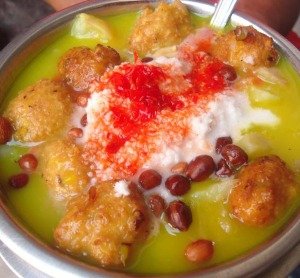
Octopus everything
BBQ octopusBBQ octopus for the win at Chumbe Island.
Zanzibar is renowned for octopus, which are caught by skilled ‘octopus hunters’ who can often be spotted wading out across the coastal flats armed with spears to catch the tasty invertebrates that thrive in the seagrass and coral beyond the beaches. Among the most popular ways to eat octopus include mishkaki skewers, octopus curry (cooked with a blend of rich spices like turmeric and simmered in coconut cream), and straight off the grill.

Mishkaki
Skewers on a grillMishkaki skewers sizzle on a Stone Town street.
Marinated in a blend of spices and sauce, then grilled to charred perfection, mishkaki (meat skewers) are an ubiquitous Zanzibarian snack food, often seen grilling in alleyways of an afternoon. Buy them straight off the grill to ensure they’re fresh.

Biryani and pilau
Thought to have originated in the Indian Subcontinent, biryani and pilau (also known as pilaf and plov) are rice dishes cooked with a mixture of spices such as nutmeg, cloves, pepper, cardamom, cinnamon, garlic, ginger and coriander.

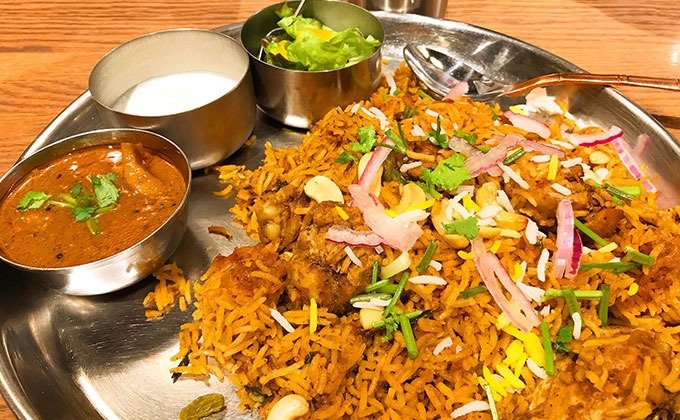
The key difference between the two is that biryani is cooked separately to the meat dishes that typically accompany it. Pilau, on the other hand, is cooked in the same pot as the meat (or meat broth), allowing the rice to absorb the juices. Both are delicious.
Zanzibar pizza
More like a galette (savoury crepe) than a pizza, a Zanzibar pizza begins as a small ball of dough that is thinned out then piled with your choice of ingredients (such as chicken or beef) followed by onion, capsicum, an egg, a triangle of Happy Cow cheese, a dollop of mayonnaise, and chilli sauce (if you like it hot).
The corners are then folded in to make a square, and the whole thing goes in the frypan. When the base is crispy, it’s flipped, then sliced into bite-sized squares, scooped onto a plate and served with a toothpick ‘fork’.

Coffee
People sitting outside a cafeStop by Jaws Corner for an Arabic coffee.

For what Muslim-majority Zanzibar lacks in bars (don’t fret – there are still a few) it makes up for in coffee shops. Perhaps the most famous (of sorts) is Jaws Corner, an intersection of alleys named for its shark mural.
Locals come here to gossip over small and inexpensive cups of black, cardamom-spiced Arabic coffee served from a mobile coffee-seller, making it a great spot to people-watch as you enjoy your own cup.
Night Life on Vacation in Zanzibar.
Nightlife in Zanzibar can be as enticing as the cultures of the world coming together to dance, or as relaxed as watching the sun set over the ocean through rose-tinted sunglasses. It is what you make of it and this island destination caters to all.

Zanzibar is known for many extraordinary things and is a traveller’s dream beach location. The Zanzibar nightlife options are fun and unique, and you could easily spend your evening at a laid-back beach bar in Kendwa or an up-market nightclub in Stone Town – the choices are at your fingertips!
Nightlife locations in Zanzibar
City centre – Stone Town, Zanzibar City
As Stone Town is where you’ll find the urban buzz of the island, it is here that you’ll have the most options within an enclosed area.
Beachside bars and lounges – Kendwa, Paje, Jambiani, Nungwi
For more of a beach party scene, you would be right to assume that the best parties are held on the famous beaches of Zanzibar themselves!
Restaurants and Bars in Zanzibar.
Types of establishments
Restaurants
Taarab restaurant,
Bahari Pizza Restaurant, Jambiani
Kambakocho Bar and Beach Restaurant, Palumbo Reef Resort
Sunset spots
6 Degrees South, Stone Town
Africa House Hotel, Stone Town
Gerry’s Bar and Restaurant, Nungwi Beach

Cocktail beach bars
Kendwa Rocks Beach Resort, Kendwa
The Rock, Pingwe
Paje by Night, Paje
Nightclubs
Garage Club, Stone Town
Red Monkey Lodge, Jambiani
Coccobello, Nungwi
Festivals in Zanzibar.
Zanzibar Nightlife Events and Festivals
Monthly – Full Moon Party – Kendwa Rocks.

Annually – Sauti za Busara – February at the Old Fort, Stone Town
Zanzibar International Film Festival – July, Stone Town
Jahazi Literary & Jazz festival – end of August/beginning of July, Stone Town
Spend your weekend days listening to well-known poets and book authors, and engaging in workshops during the festival. After, get ready to samba as you spend your evenings dancing away to jazz music during this Zanzibar nightlife annual event.
Travelling Around Zanzibar.
Getting to and from Zanzibar
There are two main entry points to Zanzibar: the airport and the seaport. Both of them will give you a bit of a chaotic arrival, so it’s useful to choose beforehand how you plan to continue to your destination.
Seaport: This is right in Stone Town, so it’s easy to walk anywhere within the old city. However, there is no public transportation in Stone Town, so the only option to reach the beach is to either take a taxi or walk about one kilometre to reach the local buses, called dala dalas.

Airport: There are plenty of taxis and the local buses also pass by the airport (outside the gates). But the buses are only city buses, so they’re sadly no help for getting to further destinations. If you’re going further than Zanzibar city, you’ll need to change at the bus station

Taxis from town (including the seaport and airport) should be about USD 30 to 60 for going to beach destinations like Nungwi, Matemwe or Paje. From the airport to Stone Town, expect to pay about USD 10.
Getting around Zanzibar
There are two options: the local dala dalas and taxis. There are also shared buses that leave from Stone Town to the beaches, which you can usually get for USD 10 per person.
Public transportation/dala dalas: Public transportation is extremely affordable, costing under USD 4, depending on your destination. They are also quite slow as they stop a lot on the way, and there usually seems to be no limit to how many people can fit on one bus! Be warned that it’ll probably take some effort to figure out which dala dala to use, though the conductors are very helpful.

Taxis: There are lots of taxis in Stone Town, but from the beach they can be harder to find. It’s always good to ask your hotel for a taxi or find a reliable company to offer you transfers. Taking a taxi in Zanzibar is generally safe, but note they’re often not punctual and tend to charge as they wish.

Shuttle Bus / Shared Taxi: Shared taxis operate on Zanzibar and by sharing the car with up to five others, it is possible to travel around the island for only $10 per person.
The shared taxis are a door-to-door service, meaning you will be collected from your current accommodation and dropped directly at your destination of choice. Essentially, it is the same as a regular taxi, just the journeys take slightly longer (because of picking up other guests).
Walking: Walking is the most efficient way to get around if you are staying in Stone Town! The town is small and safe to walk, as long as you keep an eye out for the fast-moving vespas. When you wander a bit further from the more popular, touristy areas, you will find walking very pleasant, too.
There are many police checks on the roads. Make sure you have your driving licence, the temporary Zanzibar drivers permit, the car insurance on the windscreen. Also check that the rental car is roadworthy and the police will wave you through with a kind jambo. The temporary Zanzibar drivers permit can be obtained from local authorities.
However, if you ask your car rental company in advance, they will get it for you and deliver it with the car. They need a scanned copy of your valid driving licence. Expect to pay $10 for the permit.
Airlines to Zanzibar.
Ethiopian Airline, Oman Air, Qatar Airways, Fly Dubai and Kenya Airways are providing direct international connection on scheduled basis. Other Airlines such as The Royal Dutch Airline (KLM), Swiss Air, Egypt Air, Emirates Air, South African Airlines, Rwanda Air, Air Uganda, Zambian Airways, and Air Zimbabwe fly to Dar – Es – salaam, where you can connect to Zanzibar either by Sea or by small local charters, some of which operate regular schedule services. These include Air Tanzania, Auric Air, Precision Air, Zan Air, Coastal Travel, Tropical Air, Flight Link, etc.
There are also number of regular chatter flights from Europe traveling direct to Zanzibar. Most of them are from Italy and Germany including Air Europe, Air Italy, Blue Panorama, Lauder Air, Livingstone Air, Mery Diana, Noes, etc.
The cultures in Zanzibar.
Zanzibar City, an incredible place where Africa, India and the Arab world have coexisted for centuries. It is a crossroads located on the sea route to India that was coveted by colonial powers: first the Portuguese, then the British and the Omani. Until the middle of the 19th century, spice, ivory and slave trafficking was rife in Zanzibar.
Slavery in Zanzibar.
People have lived in Zanzibar for 20,000 years. History properly starts when the islands became a base for traders voyaging between the African Great Lakes, the Somali Peninsula, the Arabian peninsula, Iran, and the Indian subcontinent. Unguja offered a protected and defensible harbor, so although the archipelago had few products of value, Omanis and Yemenis settled in what became Zanzibar City (Stone Town) as a convenient point from which to trade with towns on the Swahili Coast. They established garrisons on the islands and built the first mosques in the African Great Lakes Region.

Zanzibar was one of the largest slave ports in the vast Indian Ocean slave trade, which was dominated by Arab slave traders. The Arab slave trade originated before Islam and lasted more than a millennium.
The slavers hacked their way from Bagamoyo on the Tanzania mainland coast into the African interior, as far west as the Congo.
The slavers traded, bribed chiefs, pillaged and frequently kidnapped to meet the high demand for slaves. The newly acquired slaves were often forced to carry ivory and other goods back to Bagamoyo. The name Bagamoyo is derived from the Kiswahili words “bwaga moyo” which mean ‘lay down your heart’, because it was here that slaves would abandon any remaining hope of freedom or escape.

Slaves who survived the long and perilous hike from the interior were then crammed into wooden boats called dhows bound for the slave markets in Stone Town, Zanzibar.
It is important to understand that in the context of the Arab Slave Trade, the term Arab represents a culture as opposed to a specific race. Many of the “Arab” slave traders such as Tippu Tip and others were indistinguishable from the “Africans” whom they enslaved and sold. All of the main racial groups in Zanzibar were involved in the slave trade in some way or other.
Europeans used slaves in their plantations in the Indian Ocean islands, Arabs were the main traders, and African rulers sold prisoners taken in battle.


